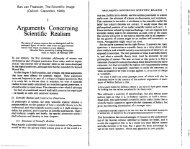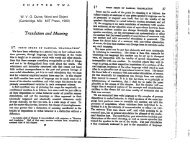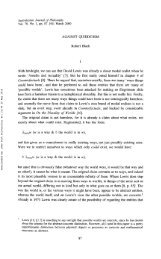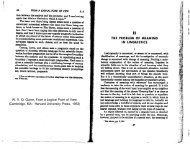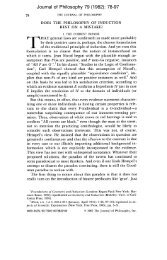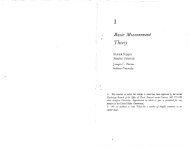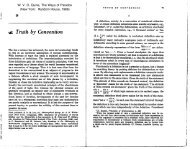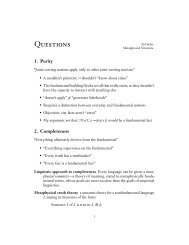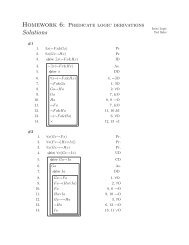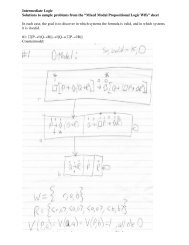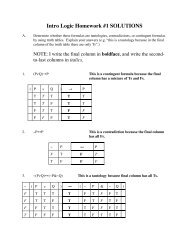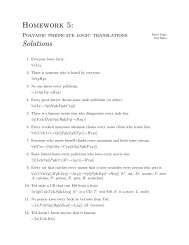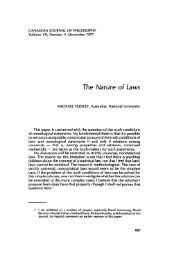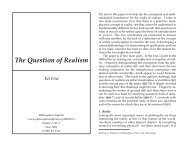Fine - guide to ground.pdf - Ted Sider
Fine - guide to ground.pdf - Ted Sider
Fine - guide to ground.pdf - Ted Sider
Create successful ePaper yourself
Turn your PDF publications into a flip-book with our unique Google optimized e-Paper software.
59<br />
more inclined, is that we understand the former in terms of the latter. One statement of<br />
consequentialist essence may be partly <strong>ground</strong>ed in others. The fact that it lies in the nature of a<br />
given set <strong>to</strong> be a set or a set, for example, is partly <strong>ground</strong>ed in the fact that it lies in the nature of the<br />
set <strong>to</strong> be a set. The constitutive claims of essence can then be taken <strong>to</strong> be those consequentialist<br />
statements of essence that are not partly <strong>ground</strong>ed in other such claims. This way of conceiving the<br />
distinction enables us <strong>to</strong> ‘fac<strong>to</strong>r out’ the purely essentialist aspect of the concept of essence from the<br />
partly explana<strong>to</strong>ry aspect. But it means that the constitutive concept of essence is then of no help <strong>to</strong><br />
us in understanding the concept of <strong>ground</strong>.<br />
But there is perhaps a more serious objection <strong>to</strong> the proposed definition, which may arise<br />
even when we make use of the constitutive conception of essence. For certain statements of essence<br />
appear <strong>to</strong> be symmetric between <strong>ground</strong> and what is <strong>ground</strong>ed. It might be thought, for example, that<br />
there is a distinction between existing at a time and existing simpliciter and that it is essential <strong>to</strong> any<br />
object that exists in time that it exists simpliciter iff it exists at a time. But the definition will then<br />
give us an equal right <strong>to</strong> say that the object exists simpliciter in virtue of existing at a time and that it<br />
exists at a time in virtue of existing simpliciter. But compatibly with the essentialist claim, we might<br />
want <strong>to</strong> make the first of these <strong>ground</strong>-theoretic statements <strong>to</strong> the exclusion of the other and we<br />
would certainly not want <strong>to</strong> make both statements under a strict conception of <strong>ground</strong> or even under a<br />
weak conception of <strong>ground</strong>, given that existing at a time essentially involves the notion of time while<br />
existing simpliciter does not.<br />
I think it should be recognized that there are two fundamentally different types of<br />
explanation. One is of identity, or of what something is; and the other is of truth, or of how things<br />
are. It is natural <strong>to</strong> want <strong>to</strong> reduce them <strong>to</strong> a common denomina<strong>to</strong>r - <strong>to</strong> see explanations of identity as<br />
a special kind of explanation of the truth or <strong>to</strong> see explanations of truth as a special kind of



